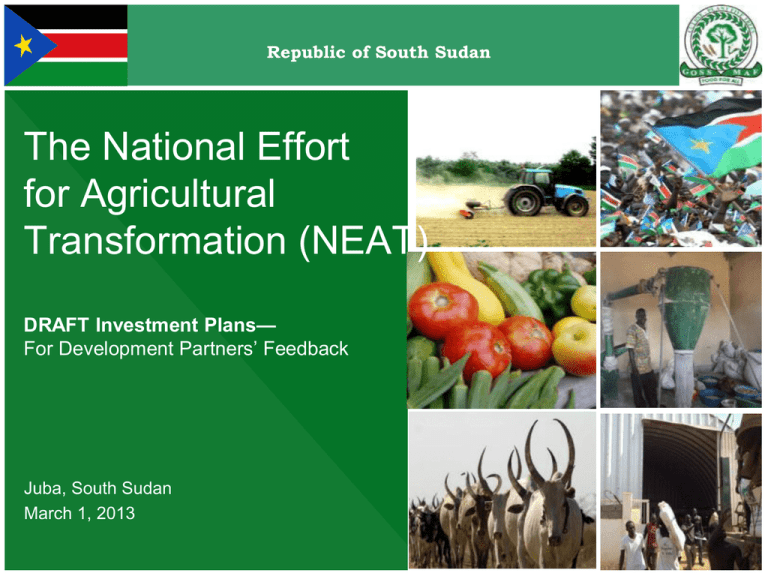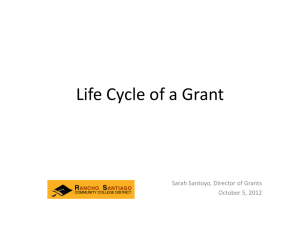- Food Security Clusters
advertisement

WORKING DRAFT Last Modified 3/4/2013 3:08 PM E. Africa Standard Time Printed 2/26/2013 6:22 PM E. Africa Standard Time Republic of South Sudan The National Effort for Agricultural Transformation (NEAT) DRAFT Investment Plans— For Development Partners’ Feedback Juba, South Sudan March 1, 2013 The National Effort for Agricultural Transformation (NEAT) will drive South Sudan towards its 2040 Agricultural Vision South Sudan has a vision for a transformed agricultural sector The National Effort for Agricultural Transformation (NEAT) will achieve this vision Improved production so the country is food secure and self-sufficient in the region NEAT has two integrated components: the Zonal Effort for Agricultural Transformation (ZEAT) and the Comprehensive Agricultural Master Plan (CAMP) Improved health and nutrition across the country 1) ZEAT is a highly prioritized zonal approach ready for rapid implementation by the rainy seasons of 2013 and 2014 Agriculture as an alternative economic engine complementing oil and gas 2) Increased incomes for >80% of the population IN PROGRESS: CAMP is a complete strategy covering agriculture and related sectors for all states and communities, to guide the country to full national and household food security; implementation should begin by 2015 Republic of South Sudan | 1 Achieving this vision requires a comprehensive and coordinated response from all stakeholders NEAT is an RSS-led effort with clear roles for all stakeholders: Ultimately we will achieve the new vision of agriculture in South Sudan MAF, State governments, Private sector entrepreneurs, donors, implementing partners, and farmers will follow Paris declaration principles: Fundamental Operating Principles: Ownership: Partner countries exercise effective leadership over development strategies and coordinate actions Alignment: Donors base overall support on partner countries' national strategies, institutions and procedures Harmonization: Donors' actions are more harmonized, transparent and collectively effective Managing for Results: Managing resources and improving decision-making for results Mutual Accountability: Donors and partners are accountable for development results 1 Mobilize the private sector to unleash agriculture as the core driver of future growth and stability 2 Employ market-based solutions to activate public and private investments 3 Empower farmers and entrepreneurs to reach their full potential 4 Integrate interventions to achieve momentum and scale 5 Collaborate with diverse stakeholders to build on strengths and distribute risk Republic of South Sudan | 2 There are four types of agricultural programs that are part of this vision Direct support to ZEAT activities Investments targeted at high potential market-ready farmers to increase national food production and make it accessible through aggregation and marketing Programs supporting cross-cutting enabling activities Investments that promote a strong enabling environment for agriculture via research, trade, land, and private sector development programs and policies Support to ZEAT implementation unit Investments that promote the recruiting, staffing, training, and ongoing administrative needs of the NEAT implementation organization Additional agricultural programming (outside ZEAT) Programs that support households to grow enough food and meet basic needs throughout the country All four types of programs are essential for agricultural development A shared vision for each type of program will help align all stakeholders Republic of South Sudan | 3 Preparing a shared investment framework for the NEAT Documenting all programs in South Sudan ▪ This plan will serve as a framework to align all stakeholders around a common approach towards agricultural investments in South Sudan, including zonal transformations and coordinating investments ▪ This framework allows stakeholders to share information about their ongoing programs and proposed new investments in four sections: Direct support to ZEAT activities Programs supporting cross-cutting enablers Support to the NEAT Implementation Unit Additional aligned activities (outside of ZEAT) ▪ An Excel file with detailed instructions will be distributed for all Development Partners to easily list programs. Then the NEAT technical working team will compile all programs in this plan ▪ The compiled program summary from these worksheets will be shared across all stakeholders to provide a common information base and allow the Ministry of Agriculture to balance resources against programs ▪ In order to ensure a quick path to implementation, please return the completed investment plan worksheets to the NEAT team by 6 March Republic of South Sudan | 4 Guiding principles to help complete investment matrices PRINCIPLE EXAMPLE Donors/Development Partners should ideally commit to most of the activities for a geography to reduce handoffs A single donor should support farmers in production and marketing rather than dividing and risking a failure to link Donor/Development Partner commitments should be for multiple years to build local knowledge Development Partner A funds the training of 30 entrepreneurs in year 1, and builds on successes to scale to 100 by year 3 Investment commitments should take advantage of the unique strengths of the implementer Implementer A specializes in warehouse management, while Implementer B utilizes teams already on-the-ground in some counties State ministries must contribute resources to activities, not just depend on donor commitments State Ministry of Agriculture trains highperforming extension agents and deploys them to priority counties Republic of South Sudan | 5 Contents Direct support to ZEAT activities Programs supporting cross-cutting enabling activities Support to ZEAT implementation unit Additional agricultural programming (outside ZEAT) Republic of South Sudan | 6 The ZEAT planning process is being rolled out across the country in 2013; state workshops are being conducted to develop strategies in 3 phases To date, the ZEAT team has completed the Greenbelt investment plan Over the next 12 months, MAF intends to develop complete plans for all remaining zones led by state ministries in partnership with other line ministries and development partners For now, please review the Greenbelt plans and identify areas where you can support immediate investment needs For all other zones, please catalog your support in the “other plans” section When ZEAT planning is complete in other zones, we will work together to realign programs to overall strategy following a similar process as completed in the Greenbelt 1 Phase 1 (ongoing): ▪ Greenbelt ▪ Hills and Mountains ▪ Eastern Flood Plains - North 2 3 1 2 Phase 2: ▪ Western Flood Plains ▪ Ironstone Plateau ▪ Arid 3 Phase 3: ▪ Eastern Flood Plains - South ▪ Nile Sobat Republic of South Sudan | 7 Greenbelt Transformation will aggregate smallholder maize and connect to markets The integrated Greenbelt transformation will tailor interventions to local contexts Build large associations in Western Equatoria ▪ Develop 4 existing and 4 new large farmer associations ▪ Link association output to large traders ▪ Develop market information system and rehabilitate trunk and feeder roads Foster agro-entrepreneurs in Central Equatoria ▪ Develop 100 agroentrepreneurs providing storage, mechanization, improved seeds, and value addition ▪ Provide intensive technical and business training ▪ Rehabilitate roads to Juba market Develop community block farms in Eastern Equatoria ▪ Organize smallholders onto 90 cleared farms ▪ Subsidize land clearance, inputs, and plowing ▪ Provide intensive production training ▪ Rehabilitate roads and develop marketing system Republic of South Sudan | 8 WESTERN EQUATORIA In Western Equatoria, prioritize supporting cooperative associations and commercial farmers to buy and sell at scale Our interventions will be: Our projected results and costs: ▪ Support 3 existing associations and ▪ Support 15,000 farmers over 3 develop 4 new associations – Build on existing successes (e.g., YAFA in Yambio with 2500 members) – Construct or rehabilitate warehouses and ensure proper fumigation – Link associations to large traders and develop processing opportunities – Provide quality extension and input subsidies ▪ Boost commercial farmers to expand land or develop outgrowers through loans and input subsidies ▪ Rehabilitate trunk roads to Juba and Wau and area years with 40 M SSP of public funds and 45 M SSP of farmer/ association funding: Engage 15,000 farmers over 3 cultivated years – Average land from – – 2.5 to 3.5 feddans Yield from 1 to 2 MT/feddan Post-harvest loss reduces from 40% to 15% ▪ Rehabilitate 1,260 km of road at SSP 605 M cost feeder roads Critical requirements for success: Funding for roads mobilized quickly so increased production does not spoil Farmer associations are sustainable and privatesector oriented—not dependent on relief ▪ Agriculture cost: SSP 88 M ▪ Infrastructure cost: SSP 605 M ▪ Total cost: SSP 693 M Republic of South Sudan | 9 WESTERN EQUATORIA Key success factors for strong, independent associations in Western Equatoria What will it take? Identify leaders of small farmer groups to form the foundation of each cooperative, through intensive recruitment and training Facilitate access to finance for each association to ensure sustained success beyond government/development partner support Connect associations to institutional buyers and private traders to purchase harvest Provide training to create a small, professional management group for each cooperative to represents the interests of its members What will be created? Co-operative associations that are profit-oriented businesses that independently organize and support farmers Republic of South Sudan | 10 WESTERN EQUATORIA Summary: Western Equatoria Investment Plan 3-year costs, SSP, ‘000 PRELIMINARY Component Co-op organization Input supply Land clearance Major activities (over 3 years) 1,040 - 1,040 ▪ Grants for 7 co-ops to purchase 10 kg seeds, 500 mL crop protection per feddan for 1 year 5,670 39,480 45,150 22,000 - 22,000 1,180 75 1,255 285 65 350 13,745 3,700 17,445 945 0 945 ▪ Grants for 7 co-ops to to expand land under cultivation by 1 feddan/farmer 500 MT warehouses for 4 new co-ops Grants for equipment/fumigation for 7 co-ops for 1 year Processing ▪ ▪ 2 MT/day maize mills for 7 co-ops Grants for fuel/maintenance for 1 year Market information system Infrastructure Total Organizers to form 4 new co-ops and strengthen 3existing coops ▪ ▪ Training/ Extension Private/ Farmer ▪ Warehousing Marketing Public/ Donor ▪ Trucks for 3 existing co-ops ▪ Grants for truck hire for 4 new co-ops ▪ Radio advertising of produce for 7 co-ops ▪ Extension agents for farmers in 20 focus payams ▪ Build market information team at the state level to track and communicate prices (3 analysts) 165 0 165 ▪ Trunk and feeder roads connecting Greater Yambio, Mundri and Maridi to Juba, Wau and Rumbek 604,450 0 604,450 649,480 43,320 692,800 Total SOURCE: Ministry of Agriculture, implementation partner, field interviews Republic of South Sudan | 11 WESTERN EQUATORIA Western Equatoria Year 1: Public/Donor investments (1/2) PRELIMINARY Strong Co-ops Ezo Input supply ▪ Management training ▪ Management training ▪ Management training ▪ Start-up grants for 425 MT ▪ Start-up grants for 425 MT ▪ Start-up grants for 425 MT Land clearance Warehousing each) each) seed Start-up grants for 10,625 L insecticide seed Start-up grants for 10,625 L insecticide seed Start-up grants for 10,625 L insecticide ▪ Start-up grants for to clear ▪ Warehouse equipment ▪ Fumigation ▪ Warehouse management training 2 MT/day maize mills Fuel/maintenance Processing ▪ ▪ Marketing ▪ 25MT trucks ▪ Business skills/marketing Salaries Support Support ▪ Strengthen co-op (2,500 each) ▪ ▪ Start-up grants for to clear 2,500 feddans Salaries M.I.S. ▪ Strengthen co-op (2,500 Yambio ▪ Strengthen co-op (2,500 training Extension Nzara Organization ▪ Cooperative associations RSS commitments ▪ ▪ Start-up grants for to clear 2,500 feddans ▪ Warehouse equipment ▪ Fumigation ▪ Warehouse management ▪ ▪ training 2 MT/day maize mills Fuel/maintenance ▪ 25MT trucks ▪ Business skills/marketing training 2,500 feddans ▪ Warehouse equipment ▪ Fumigation ▪ Warehouse management ▪ ▪ training 2 MT/day maize mills Fuel/maintenance ▪ 25MT trucks ▪ Business skills/marketing training ▪ 20 agents (1 per payam); 2 managers ▪ Training in agronomy, organizing, and marketing; support package ▪ 2 market information system analysts; 1 manager ▪ Analytical/database training for price monitoring; support package Republic of South Sudan 1 50% take-up expected | 12 WESTERN EQUATORIA Western Equatoria Year 1: Public/Donor investments (2/2) PRELIMINARY Emerging Co-ops Ibba Maridi Mundri East Mundri West Organization ▪ Form co-op (250 ▪ Form co-op (250 ▪ Form co-op (250 ▪ Form co-op (250 Input supply ▪ Mgmt training ▪ Start-up grants for each) 50 MT seed Cooperative associations Warehousing 50 MT seed each) ▪ Mgmt training ▪ Start-up grants for 50 MT seed each) ▪ Mgmt training ▪ Start-up grants for 50 MT seed ▪ Start-up grants for ▪ Start-up grants for ▪ Start-up grants for ▪ Start-up grants for 2,500L insecticide 2,500L insecticide 2,500L insecticide 2,500L insecticide ▪ 500 MT warehouse ▪ 500 MT warehouse ▪ 500 MT warehouse ▪ 500 MT warehouse and equipment Marketing Salaries Support Salaries Support and equipment and equipment and equipment ▪ Fumigation ▪ Mgmt training ▪ Maize mills ▪ Fuel/maintenance ▪ Fumigation ▪ Mgmt training ▪ Maize mills ▪ Fuel/maintenance ▪ Fumigation ▪ Mgmt training ▪ Maize mills ▪ Fuel/maintenance ▪ Fumigation ▪ Mgmt training ▪ Maize mills ▪ Fuel/maintenance ▪ Truck hire grant ▪ Business skills/ ▪ Truck hire grant ▪ Business skills/ ▪ Truck hire grant ▪ Business skills/ ▪ Truck hire grant ▪ Business skills/ marketing training M.I.S. each) ▪ Mgmt training ▪ Start-up grants for Land clearance Processing Extension RSS commitments marketing training marketing training marketing training ▪ 20 agents (1 per payam); 2 managers ▪ Training in agronomy, organizing, and marketing; support package ▪ 2 market information system analysts; 1 manager ▪ Analytical/database training for price monitoring; support package Republic of South Sudan 1 50% take-up expected | 13 WESTERN EQUATORIA Western Equatoria Years 1-3: Public/Donor investments (1/2) PRELIMINARY Strong Co-ops Ezo Input supply ▪ Management training ▪ Management training ▪ Management training ▪ Start-up grants for 425 MT ▪ Start-up grants for 425 MT ▪ Start-up grants for 425 MT Land clearance Warehousing each) each) seed Start-up grants for 10,625 L insecticide seed Start-up grants for 10,625 L insecticide seed Start-up grants for 10,625 L insecticide ▪ Start-up grants for to clear ▪ Warehouse equipment ▪ Fumigation ▪ Warehouse management training 2 MT/day maize mills Fuel/maintenance Processing ▪ ▪ Marketing ▪ 25MT trucks ▪ Business skills/marketing Salaries Support Support ▪ Strengthen co-op (3,000 each) ▪ ▪ Start-up grants for to clear 8,000 feddans Salaries M.I.S. ▪ Strengthen co-op (3,000 Yambio ▪ Strengthen co-op (3,000 training Extension Nzara Organization ▪ Cooperative associations RSS commitments ▪ ▪ Start-up grants for to clear 8,000 feddans ▪ Warehouse equipment ▪ Fumigation ▪ Warehouse management ▪ ▪ training 2 MT/day maize mills Fuel/maintenance ▪ 25MT trucks ▪ Business skills/marketing training 8,000 feddans ▪ Warehouse equipment ▪ Fumigation ▪ Warehouse management ▪ ▪ training 2 MT/day maize mills Fuel/maintenance ▪ 25MT trucks ▪ Business skills/marketing training ▪ 20 agents (1 per payam); 2 managers ▪ Training in agronomy, organizing, and marketing; support package ▪ 2 market information system analysts; 1 manager ▪ Analytical/database training for price monitoring; support package Republic of South Sudan 1 50% take-up expected | 14 WESTERN EQUATORIA Western Equatoria Years 1-3: Public/Donor investments (2/2) PRELIMINARY Emerging Co-ops Ibba Maridi Organization ▪ Form co-op (1,500 ▪ Form co-op (1,500 ▪ Form co-op (1,500 ▪ Form co-op (1,500 Input supply ▪ Mgmt training ▪ Start-up grants for each) 50 MT seed Cooperative associations Land clearance Warehousing Marketing Support Salaries M.I.S. Support 50 MT seed each) ▪ Mgmt training ▪ Start-up grants for 50 MT seed Mundri West each) ▪ Mgmt training ▪ Start-up grants for 50 MT seed ▪ Start-up grants for ▪ Start-up grants for ▪ Start-up grants for 2,500L insecticide 2,500L insecticide 2,500L insecticide 2,500L insecticide ▪ Start-up grants for ▪ Start-up grants for ▪ Start-up grants for ▪ Start-up grants for to 6,000 feddans to 6,000 feddans to 6,000 feddans to 6,000 feddans ▪ 500 MT warehouse ▪ 500 MT warehouse ▪ 500 MT warehouse ▪ 500 MT warehouse and equipment and equipment and equipment ▪ Fumigation ▪ Mgmt training ▪ Maize mills ▪ Fuel/maintenance ▪ Fumigation ▪ Mgmt training ▪ Maize mills ▪ Fuel/maintenance ▪ Fumigation ▪ Mgmt training ▪ Maize mills ▪ Fuel/maintenance ▪ Fumigation ▪ Mgmt training ▪ Maize mills ▪ Fuel/maintenance ▪ Truck hire grant ▪ Business skills/ ▪ Truck hire grant ▪ Business skills/ ▪ Truck hire grant ▪ Business skills/ ▪ Truck hire grant ▪ Business skills/ marketing training Salaries each) ▪ Mgmt training ▪ Start-up grants for Mundri East ▪ Start-up grants for and equipment Processing Extension RSS commitments marketing training marketing training marketing training ▪ 20 agents (1 per payam); 2 managers ▪ Training in agronomy, organizing, and marketing; support package ▪ 2 market information system analysts; 1 manager ▪ Analytical/database training for price monitoring; support package Republic of South Sudan 1 50% take-up expected | 15 WESTERN EQUATORIA Western Equatoria Years 1-3: Road investments PRELIMINARY Yambio-Wau 435 kilometers - 274 million SSP Mundri-Rumbek 250 kilometers - 110 million SSP Mundri-Juba 185 kilometers – 89 million SSP Yambio-Maridi 130 kilometers – 62 million SSP Maridi-Mvolo 155 kilometers – 37 million SSP Nzara-Sakure 37 kilometers – 15 million SSP Roads Mundri-Bangolo 27 kilometers – 11 million SSP Mundri-Amadi 20 kilometers – 6 million SSP Republic of South Sudan | 16 CENTRAL EQUATORIA In Central Equatoria, prioritize supporting agro-entrepreneurs and farmer associations to provide smallholder value-chain services Our interventions will be: Our projected results and costs: ▪ Spur 100 entrepreneurs to fill gaps in ▪ Support 12,000 farmers over 3 ▪ ▪ the value-chain for farmers and groups – Mechanization service (tractor and bulldozer) expands land clearance – Input dealers sell quality seeds and plant protection – Warehouses and processing improve market opportunities RSS provides extension training and subsidies Support 4 private associations with outgrowers to through organizing, warehouse and transport support ▪ Rehabilitate Juba-Yei and Juba-Kajokeji roads, and years with 20M SSP of public funds and 100M SSP of ongoing entrepreneur costs Engageoperating 15,000 farmers over 3 years increases from – Land cultivated – – 2 to 3 feddans Yield increases from 0.8 to 1.6 MT/feddan Post-harvest loss reduces from 30% to 15% ▪ Rehabiliate 545 kms of road at 455M SSP construct new feeder roads Critical requirements for success: ▪ Solid talent-pool and financial resources to mobilize entrepreneurs ▪ Quick improvement of roads connecting farmers and markets SOURCE: Source Agriculture cost: SSP 120M Infrastructure cost: SSP 455 M Total cost: SSP 575M Republic of South Sudan | 17 CENTRAL EQUATORIA Key success factors for private sector agro-entrepreneurs in Central Equatoria What will it take? Establish clear expectations and contracts with entrepreneurs detailing support, performance targets, and consequences for management failure Provide ongoing training to each entrepreneur on business and technical management (e.g. accounting, marketing, warehouse cleaning) Connect entrepreneurs with service support (e.g. mechanics for tractors & mills, warehouse suppliers) What will be created? Private sector entrepreneurs that are able to connect with smallholder farmers and FBOs and create sustainable linkages along the value chain Connect entrepreneurs to smallholder farmer groups to help groups to grow and ensure businesses have a market for their services Republic of South Sudan | 18 CENTRAL EQUATORIA Summary: Central Equatoria Investment Plan 3-year costs SSP, ‘000 PRELIMINARY Component Major activities (over 3 years) Public/ Donor PRELIMINARY Private/ Farmer Total Warehouse operator Establish/train 35 warehouse operators to purchase locally ▪ Construct 40 500MT warehouses and equipment ▪ Start-up capital for seasonal offtake purchases 8,240 77,550 85,790 Tractor/Bull dozer hire Establish/train 24 mechanization providers across CES ▪ Purchase 20 75hp 4-wheel tractors and 4-bulldozers ▪ Ongoing fuel and maintenance 4,560 3,140 7,700 Establish/train 20 processing operations focused on maize ▪ Purchase 20 2MT/day maize mill ▪ Construct 20 150MT stores near mills 2,170 14,230 16,400 Processors Seed dealers Establish/train 20 seed and input dealerships ▪ Support 20 stores to start-up ▪ Subsidize initial stock of improved seed 2,800 3,750 6,550 Private association Organize/train 4 private associations to aggregate supply ▪ Construct 4 1000MT warehouse ▪ Purchase 4 20MT-capacity lorry 2,950 1,580 4,530 20 public extension agents reactivated to cover all payams ▪ Agent salary ▪ Motorcycle 710 0 710 Extension Infrastructure 430 kilometers of trunk and feeder roads connected to Yei/Kajokeji 453,600 0 453,600 Total 475,030 100,250 575,280 Republic of South Sudan | 19 CENTRAL EQUATORIA Central Equatoria Year 1: Public/Donor investments RSS commitments PRELIMINARY Mechanization hire Entrepreneur support Lainya ▪ 1 tractor ▪ Operation training ▪ 1 dealer Seed dealer ▪ Seed training ▪ Startup grant Processor Warehouse operator Yei ▪ 2 tractors ▪ Operation training ▪ 2 dealers ▪ Seed training ▪ Startup grant Morobo ▪ 1 tractor ▪ Operation training ▪ 1 dealer ▪ Seed training ▪ Startup grant ▪ 2 dealers ▪ Seed training ▪ Startup grant ▪ 1 mill ▪ 1 150MT store ▪ Mill training ▪ 2 mills ▪ 1 mill ▪ 2 150MT stores ▪ 1 150MT store ▪ Mill training ▪ Mill training ▪ 2 mills ▪ 2 150MT stores ▪ Mill training ▪ 2 500MT ▪ 4 500MT ▪ 4 500MT ▪ warehouses Mgmt training ▪ warehouses Mgmt training ▪ 2 500MT ▪ warehouses Mgmt training ▪ warehouses Mgmt training ▪ Organizing 1 Association Organizing with outgrowers Infrastructure Extension service Kajokeji ▪ 2 tractors ▪ Operation training large coop ▪ 1000MT store ▪ Lorry Salary ▪ 4 extension agents (1 agent per county) Support ▪ 4 motorcycles and supplies ▪ Agronomy training Republic of South Sudan | 20 CENTRAL EQUATORIA Central Equatoria Years 1-3: Public/Donor Investments RSS commitments PRELIMINARY Lainya Extension service Kajokeji ▪ 6 tractors ▪ 1 bulldozer ▪ Oper. training ▪ 4 tractors ▪ 1 bulldozer ▪ Oper. training ▪ 6 tractors ▪ 1 bulldozer ▪ Oper. training ▪ 4 dealers Seed dealer ▪ Seed training ▪ Startup grant ▪ 6 dealers ▪ Seed training ▪ Startup grant ▪ 4 dealers ▪ Seed training ▪ Startup grant ▪ 6 dealers ▪ Seed training ▪ Startup grant Processor Warehouse operator Association with outgrowers Morobo ▪ 4 tractors ▪ 1 bulldozer ▪ Oper. training Mechanization hire Entrepreneur support Yei ▪ 4 mills ▪ 6 mills ▪ 4 mills ▪ 6 mills ▪ 4 150MT stores ▪ 6 150MT stores ▪ 4 150MT stores ▪ 6 150MT stores ▪ Mill training ▪ Mill training ▪ Mill training ▪ Mill training ▪ 8 500MT ▪ warehouse Mgmt training ▪ 12 500MT ▪ warehouse Mgmt training ▪ 8 500MT ▪ ▪ 12 500MT warehouse Mgmt training ▪ warehouse Mgmt training ▪ Organizing 1 ▪ Organizing 1 ▪ Organizing 1 ▪ Organizing 1 large coop large coop large coop large coop Infrastructure ▪ 1000MT store ▪ Lorry ▪ 1000MT store ▪ Lorry ▪ 1000MT store ▪ Lorry ▪ 1000MT store ▪ Lorry Salary ▪ 20 extension agents (1 agent per payam) Support ▪ 20 agent motorcycles and supplies Organizing ▪ Agronomy training Republic of South Sudan | 21 CENTRAL EQUATORIA Central Equatoria Years 1-3: Road investments PRELIMINARY Roads Juba-Kajokeji 75 kilometers - 36 million SSP Juba-Kaya 185 kilometers - 304 million SSP Yei-New Lasu 45 kilometers - 18 million SSP MoroboKajokeji 125 kilometers - 50 million SSP Limbe-Kajokeji 115 kilometers - 46 million SSP Republic of South Sudan | 22 EASTERN EQUATORIA In Eastern Equatoria, prioritize establishing community block farms that clear new land and aggregate production Our interventions will be: Our projected results and costs: ▪ Support 90 community block farms ▪ Support 9,000 farmers over 3 years over a 3 year period – Each farm has 100 smallholders with 2 feddans (18,000 total) – Subsidize land clearance – Provide intensive training through extension and subsidize seeds, crop protection and plowing – Construct warehouses to aggregate output on each farm ▪ Rehabilitate feeder roads around Magwi, Torit and Ikotos with 186 million SSP of public funds and 37 million SSP of farmer/ association funding: Engage 15,000 farmers over 3 years – Cultivated land from 2 to 4 feddans (2 at home; 2 on block) – Yield from 0.4 to 1.2 MT/feddan – Post-harvest loss reduces from 30% to 15% – Participating farmers also improve home plot production – Farmers go to market with surplus ▪ Rehabiliate 326 kms of road at 130 million SSP Critical requirements for success: ▪ Funding and labor mobilized quickly to clear huge amounts of land (possible army or DDR program) ▪ Market focused training and connection to output markets Agriculture cost: SSP 84 million Infrastructure cost: SSP 130 million Total cost: SSP 214 Million Republic of South Sudan | 23 EASTERN EQUATORIA Key success factors for self-sustaining block farms in Eastern Equatoria What will it take? Identify and develop capable farm managers for block farm operations— ensuring managers are incentivized based on farm success Facilitate access to finance and training for each block farm to ensure success after development partners leave Connect block farms to institutional buyers and private traders to purchase harvest What will be created? Self-sustaining block farms that are business-minded and do not need ongoing subsidies or support Republic of South Sudan | 24 EASTERN EQUATORIA Summary: Eastern Equatoria Investment Plan PRELIMINARY 3-year costs, SSP, ‘000 PRELIMINARY Major activities (over 3 years) Component Group formation Land clearance Farming Aggregation Marketing Infrastructure ▪ ▪ ▪ ▪ ▪ ▪ ▪ Identify 90 farm groups interested in block farming Develop and agree by-laws Build capacity for group to work as an institution Select and hire farm managers Secure 90 separate 200-feddan tracts of land Clear land while reserving necessary trees Hire surveyor to demarcate farm into 2 feddan plots Public/ Donor Private/ Farmer Total 3,300 … 3,300 16,600 … 16,600 ▪ ▪ ▪ ▪ Conduct on-farm agronomic training course (extension) 32,900 Seed purchase (25% subsidy each year) Plowing and harrowing (100% subsidized in the first year) Crop protection (50% subsidy each year) 25,200 58,100 ▪ ▪ ▪ ▪ Construct 100 MT warehouses Train co-op manager on systems and fumigation Annual fumigation costs (100% subsidy in first year) 5,100 300 5,400 150 390 540 130,000 … 130,000 188,050 25,890 213,940 ▪ ▪ Build market information team at the state level to track and communicate prices (3 analysts) Market-oriented training on how to link to buyers Radio advertisements of output ▪ 5 priority feeder roads to connect output and markets within Eastern Equatoria Total SOURCE: Ministry of Agriculture, implementation partner, field interviews, Republic of South Sudan | 25 EASTERN EQUATORIA Eastern Equatoria Year 1: Public/Donor investments RSS commitments PRELIMINARY Magwi: 5 Farms Group Formation Land Clearance Block Farms ▪ 500 farmers organized ▪ 10 farm managers hired and trained ▪ 500 feddans cleared and trained ▪ 1,000 feddans cleared and demarcated ▪ Seed and crop protection Farming Support ▪ subsidies Plowing subsidies demarcated ▪ Seed and crop protection ▪ subsidies Plowing subsidies Warehouses ▪ 5 constructed and fumigated ▪ 10 constructed and fumigated ▪ Management training ▪ Management training Salary and training ▪ 15 dedicated extension worker salaries Support ▪ Support package (motorcycle, fuel, office supplies) Salary ▪ 3 dedicated analyst salaries Support and training ▪ Analytical/database training for price monitoring ▪ Support package (cell phone, airtime, motorcycle) Extension Market Info System ▪ 250 farmers organized ▪ 5 farm managers hired and Torit-Ikotos: 10 Farms Republic of South Sudan | 26 EASTERN EQUATORIA Eastern Equatoria Years 1-3: Public/Donor investments RSS commitments PRELIMINARY Magwi: 30 Farms Group Formation Land Clearance Block Farms ▪ 6,000 farmers organized ▪ 60 farm managers hired and trained ▪ 6,000 feddans cleared and trained ▪ 12,000 feddans cleared and demarcated ▪ Seed and crop protection Farming Support ▪ subsidies (3 years) Plowing subsidies (1 year) demarcated ▪ Seed and crop protection ▪ subsidies (3 years) Plowing subsidies (1 year) Warehouses ▪ 30 constructed and fumigated ▪ Management training Salary and training ▪ 90 dedicated extension worker salaries Support ▪ Support package (motorcycle, fuel, office supplies) Salary ▪ 3 dedicated analyst salaries Support and training ▪ Analytical/database training for price monitoring ▪ Support package (cell phone, airtime, motorcycle) Extension Market Info System ▪ 3,000 farmers organized ▪ 30 farm managers hired and Torit-Ikotos: 60 Farms ▪ 60 constructed and fumigated ▪ Management training Republic of South Sudan | 27 EASTERN EQUATORIA Committed construction by World Bank Eastern Equatoria Years 1-3 Road Investments PRELIMINARY Roads Magwi-Labone 70 kilometers - 28 million SSP Torit - Ikotos 71 kilometers - 28 million SSP Magwi-Torit 54 kilometers - 22 million SSP Lafon-Torit 81 kilometers - 32 million SSP Pajok-Pageri 50 kilometers - 20 million SSP Republic of South Sudan | 28 Contents Direct support to ZEAT activities Programs supporting cross-cutting enabling activities Support to ZEAT implementation unit Additional agricultural programming (outside ZEAT) Republic of South Sudan | 29 Documenting financial institution contributions to ZEAT strategy Financial offering Cooperative lending Institution Lender A Geographic focus (States) No. loans extended ▪ W. Equatoria 200 ▪ E. Equatoria PRELIMINARY Average loan size Total ag. lending outstanding SSP 40,000 SSP 8,000,000 Loans to registered coops/ FBOs Loan guarantees Sharing risk with lenders Asset-backed lending Allowing farmers to use farming assets as collateral Commercial farm lending Agriculture-focused commercial loan products Republic of South Sudan | 30 Documenting other cross-cutting enablers for ZEAT strategy Institution Supporting strong local research EstablishIng land security Creating growthfriendly trade policy ▪ AGRA Enabling environment programs Established seed research centers for breeding and testing varieties (e.g. Palotaka) ▪ (add actor here) ▪ USAID (add contributing activities) Surveying and titling farmer landholdings in 2 counties ▪ (add actor here) (add contributing activities) ▪ Ministry of Commerce Duty-free agricultural inputs, Customs (add actor here) (add contributing activities) ▪ policy (e.g. border clearance) Republic of South Sudan | 31 Documenting private sector investment in ZEAT strategy Investor Tractor dealer A Geographic focus for investment Value chain focus Nature of investment ▪ Central Equatoria ▪ Western Equatoria Production (mechanization) Discounted leasing of tractors/bulldozers to 5 private associations (Add investment details here) SOURCE: Source Republic of South Sudan | 32 Contents Direct support to ZEAT activities Programs supporting cross-cutting enabling activities Support to ZEAT implementation unit Additional agricultural programming (outside ZEAT) Republic of South Sudan | 33 The success of the transformation will depend on a creating a dedicated implementation unit National transformations are deeply complex … Size and complexity of the challenge: NEAT encompasses 7 different zonal strategies across 10 states Speed required: RSS has established a very near-term food self-sufficiency goal Number of stakeholders: Transforming agriculture requires multi-sector cooperation as well as support from many development partners and the private sector Large financial commitments: Public sector and donor funding requirements are large and interdependent … Implementation units help overcome many of these challenges a single, Follow coordinated action and investment plan bureaucracy with Minimize a fast-acting unit together a team Bring of high performing leadership joint donor/ Develop government monitoring to track progress Republic of South Sudan | 34 The unit will be responsible for the execution and management of the ZEAT agenda in each zone The implementation unit will drive three consecutive processes : Strategic design Implementation planning Delivery coordination Design the quick-win strategic opportunity for each zone (focus on incomplete zones) Translate strategic plans into clear, detailed action and investment plans for implementation Coordinate implementation in priority zones—including regular progress reviews to course-correct Republic of South Sudan | 35 In Year 1, the Implementation Unit would support the first 3 zones with ~30 field staff--mostly seconded from existing Ministry employees First phase implementation: Eastern Flood Plains – North (Renk) ▪ 1 Zonal Director ▪ 2 Data/M&E Collection Agents ▪ 1 County Implementation leaders Renk A State Effort for Agricultural Transformation (SEAT) team will provide policy and implementation guidance in each state Mundri Ibba West Mundri East Yambio Maridi Nzara Torit Yei Lainya Kajo- Magwi Ikotos Keji Ezo Morobo Greenbelt Zone ▪ 1 Zonal Director ▪ 6 Data/M&E Collection Agents ▪ 12 County Implementation Leaders Hills and Mountains ▪ 1 Zonal Director ▪ 5 County Implementation Leaders ▪ Data collection shared with Greenbelt 1 Only includes new costs (i.e. salaries for staff who are already in the ministry are not counted) Republic of South Sudan | 36 Summary: Implementation Unit PRELIMINARY Component Salary Transport Communicati on Major activities (over 3 years) ▪ ▪ ▪ ▪ ▪ CEO (SSP 400,000/yr) Director of M&E (SSP 50,000/yr) 2 Zonal Directors (SSP 50,000/yr) 1 office manager (SSP 9,600/yr) 1 administrative assistant (SSP 7,200/yr) ▪ Car, Driver, Fuel and Maintenance for salaried positions Motorcycle for State Data Collectors and County Implementers ▪ ▪ ▪ 3-year costs SSP, ‘000 Total 1,870 2,640 Laptop and Modem for CEO, M&E Director, Zone Directors, State Data Collectors, and Office Manager Cell phone and Airtime for National positions and staff, State Data Collectors, and County Implementers Total 140 4,650 Republic of South Sudan | 37 Implementation Unit Year 1: Public/Donor Investments PRELIMINARY National Salary Salary County ▪ State Data Collectors ▪ County implementers ▪ State Data Collectors ▪ County implementers ▪ County implementers ▪ CEO ▪ M&E Director ▪ Zone Directors ▪ Office mgr & asst ▪ ▪ ▪ CEO M&E Director Zone Directors Driver ▪ ▪ ▪ CEO M&E Director Zone Directors Maintenance ▪ CEO ▪ M&E Director ▪ Zone Directors Motorcycle ▪ ▪ ▪ CEO M&E Director Zone Directors Fuel ▪ ▪ ▪ CEO M&E Director Zone Directors ▪ Laptop/ modem ▪ CEO ▪ M&E Director ▪ Zone Directors ▪ Office mgr State Data Collectors Cell phone/ Airtime ▪ ▪ ▪ ▪ ▪ State Data Collectors Car Transport State Communication CEO M&E Director Zone Directors Office mgr/asst Republic of South Sudan | 38 Implementation Unit Years 1-3: Public/Donor Investments National PRELIMINARY Salary Salary County ▪ State Data Collectors ▪ County implementers ▪ State Data Collectors ▪ County implementers ▪ County implementers ▪ CEO ▪ M&E Director ▪ Zone Directors ▪ Office mgr & asst ▪ ▪ ▪ CEO M&E Director Zone Directors Driver ▪ ▪ ▪ CEO M&E Director Zone Directors Maintenance ▪ CEO ▪ M&E Director ▪ Zone Directors Motorcycle ▪ ▪ ▪ CEO M&E Director Zone Directors Fuel ▪ ▪ ▪ CEO M&E Director Zone Directors ▪ Laptop/ modem ▪ CEO ▪ M&E Director ▪ Zone Directors ▪ Office mgr State Data Collectors Cell phone/ Airtime ▪ ▪ ▪ ▪ ▪ State Data Collectors Car Transport State Communication CEO M&E Director Zone Directors Office mgr/asst Republic of South Sudan | 39 Contents Direct support to ZEAT activities Programs supporting cross-cutting enabling activities Support to ZEAT implementation unit Additional agricultural programming (outside ZEAT) Republic of South Sudan | 40 Ongoing successful programs outside the ZEAT will continue to receive support to promote household self-sufficiency MAF promotes food security through two complementary and necessary approaches National food security Eliminate the country’s food deficit by aggregating and marketing smallholder production and supporting commercial farming Immediate goal of the ZEAT Take advantage of zones with a high number of market-ready farmers to quickly achieve increased production Household self-sufficiency Support households to grow enough food to meet basic needs and ultimately see farming as a business Ongoing support for successful programs Coordinate support from government and development partners to provide basic training and inputs to households and farmer groups MAF should catalog all ongoing government and development partner agriculture programs to balance resources against them Republic of South Sudan | 41 Documenting additional agricultural programs outside direct ZEAT strategy Name of donor/development partner: Government and development partners should describe programs outside of ZEAT on the worksheet below Program Target population (Market-driven or household food security) Target zone and specific state(s) (e.g., W. Flood Plains / NBEGS) Both market-driven Greenbelt / WES, Example: and household CES, EES On-Farm Demonstration food security Trials Commodity focus (e.g., maize, livestock) Maize Value-chain focus (e.g., inputs, postharvest, marketing) # smallholders reached Production (improved inputs and agronomic techniques) 300 households Total increased production (MT) 660 MT (Yield from 800-3000 kg/ HH ) 1) 2) 3) 4) Republic of South Sudan | 42 Appendix: Further Greenbelt Zone details available upon request ▪ Line-by-line costs for Years 1-3 ▪ Monthly action plans for Year 1 Republic of South Sudan | 43








